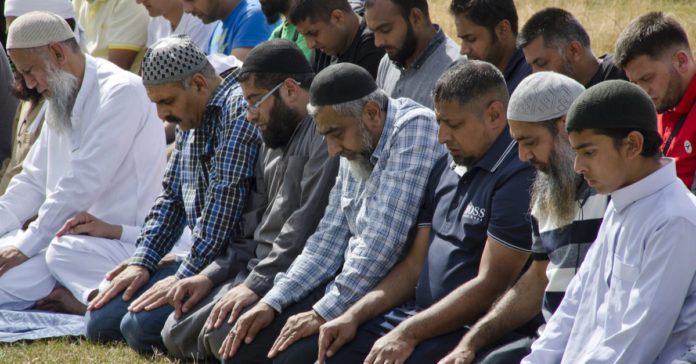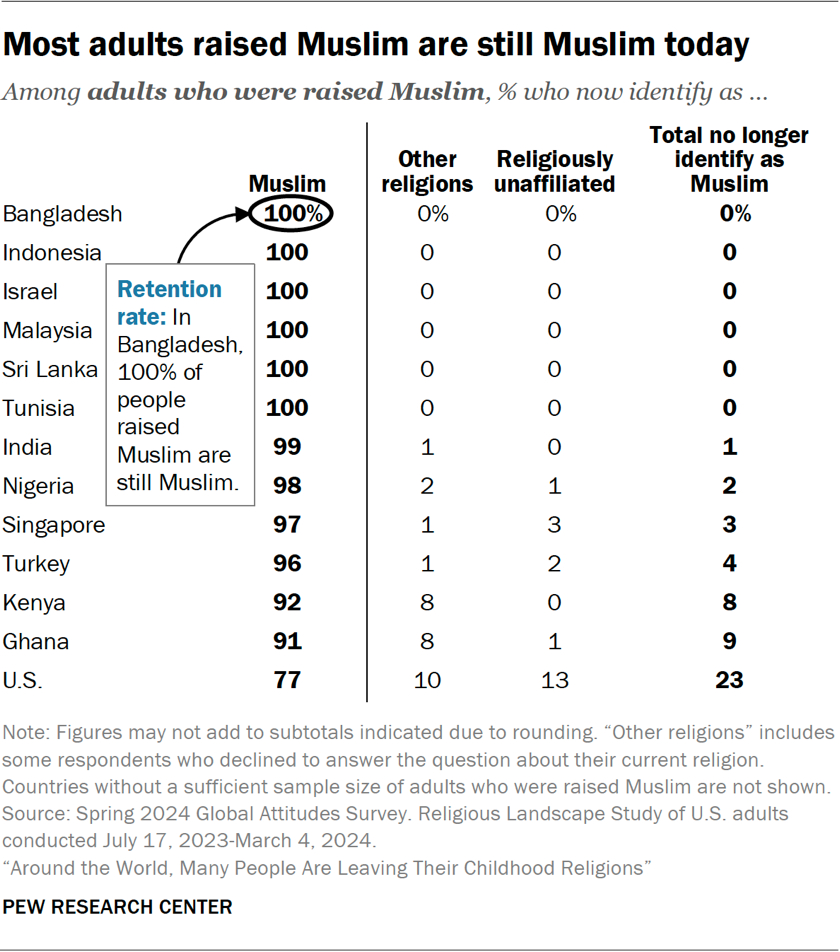A new survey by the Pew Research Center has revealed that Islam has the highest retention rates (people born Muslim still identifying as Muslim as adults) of any world religion.
The analysis of 13 countries around the world with large Muslim percentages indicates that very small percentages of the overall adult population have left Islam.
In these countries, most adults who currently identify as Muslims say they were raised in Islam. This includes nearly all Muslims surveyed in Bangladesh, India, Indonesia, Israel, Tunisia and Turkey.
In several countries, nearly all adults who were raised Muslim still identify that way today, yielding high Muslim retention rates.
The U.S. and Kenya have the highest levels of “accession,” or entrance, into Islam, with 20% of U.S. Muslims and 11% of Kenyan Muslims saying they were raised in another religion or with no religion.
Among those who have switched into Islam, most say they were raised Christian.
In the U.S. – which also has the lowest retention rate among Muslims in the countries surveyed – roughly three-quarters of Americans who were raised Muslim still identify as Muslims today.
Subscribe to our newsletter and stay updated on the latest news and updates from around the Muslim world!
On the other hand, in most of the countries surveyed, Christianity has the highest ratios of people leaving to people joining – the largest net losses.
In Germany, for example, this ratio among Christians is 19.7 to 1.0, meaning there are nearly 20 Germans who say they were raised as Christians in childhood but don’t consider themselves Christian today for every one German who has become a Christian after being raised in another world religion or in no religion.
The survey also shows that Buddhism is experiencing large losses from religious switching – mostly disaffiliation – in a few countries, such as Japan, Singapore and South Korea.
However, the leaving-to-joining ratios are not as high as those for Christianity. For instance, in Japan – the country with the largest percentage of people who say they were raised Buddhist but are no longer Buddhists – the leaving-to-joining ratio among Buddhists is 11.7 to 1.0.
Other key findings
The Pew Research Center’s report, “Around the World, Many People Are Leaving Their Childhood Religions,” was published on March 26, and examines global trends in religious switching based on surveys conducted across 36 countries with nearly 80,000 respondents.
The study reveals that in many nations, at least 20% of adults no longer identify with the religion of their upbringing, with Christianity and Buddhism experiencing the most significant losses.
The data highlights stark regional differences. In East Asia, Western Europe, and North America, switching is widespread. South Korea stands out with 50% of adults having left their childhood faith, while the U.S. sees 28% and the Netherlands 36%. Brazil also reports a notable 21% shift.
In contrast, countries like India, Israel, Nigeria, and Thailand show remarkable stability, with over 95% of adults retaining their childhood religion.
The primary direction of switching globally is toward disaffiliation, particularly from Christianity, which dominates losses in Western nations, and Buddhism, notably in Japan (26% loss) and South Korea (61% of those raised Buddhist no longer identify as such).
Younger adults drive much of this change, with higher disaffiliation rates than older generations. In Spain, 48% of 18- to 34-year-olds have switched compared to 36% of those over 50, and in Colombia, 34% of young adults versus 14% of older adults.
Disaffiliation often means leaving Christianity — 26% of young Colombians raised Christian now claim no religion, versus 9% of older adults.
Buddhism’s losses are similarly pronounced in East Asia, with Japan and South Korea showing significant shifts to unaffiliated status.
Meanwhile, the unaffiliated category grows, fueled by secular trends and disillusionment, though the study cautions that it captures lifetime shifts, not just recent changes.
























